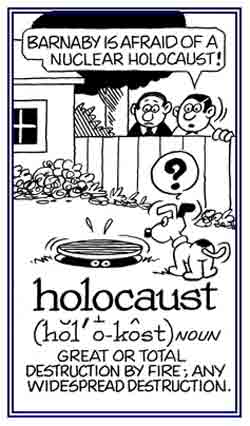The high floods along the river caused a disaster to the farms. It was truly a tragedy that so many farmers lost their livestock; however, the oldest farmer was philosophical, reminding everyone that at least it was not a holocaust, because no buildings were burned.
2. A sacrifice completely consumed by fire; burned offering: Historical records reveal that many religions in the past used a form of holocaust when they sacrificed animals to their gods.
3. The systematic mass slaughter of European Jews who were placed in Nazi concentration camps during World War II (usually preceded by "the" and capitalized; such as, The Holocaust).
4. Any mass slaughter or reckless destruction of life: Totality of destruction has been central to the meaning of holocaust since it first appeared in Middle English in the 14th century, used in reference to the biblical sacrifice in which a male animal was wholly burnt, or cremated, on the altar in worship of God.
5. Etymology: from Greek holokaustos, "that which is completely burned", which was a translation of a Hebrew word, literally, "that which goes up", that is, "in smoke". In this sense of "burnt sacrifice", holocaust is still used in some versions of the Bible.
In the 17th century the meaning of holocaust broadened into "something totally consumed by fire", and the word eventually was applied to fires of extreme destructiveness.
In the 20th century, holocaust has taken on a variety of figurative meanings, summarizing the effects of war, rioting, storms, epidemic diseases, and even economic failures.
Most of these terms came into existence after World War II, but it is unclear whether they resulted from the use of holocaust in reference to the mass murder of European Jews and others by the Nazis. This application of the word occurred as early as 1942, but the phrase The Holocaust did not become established until the late 1950s.

